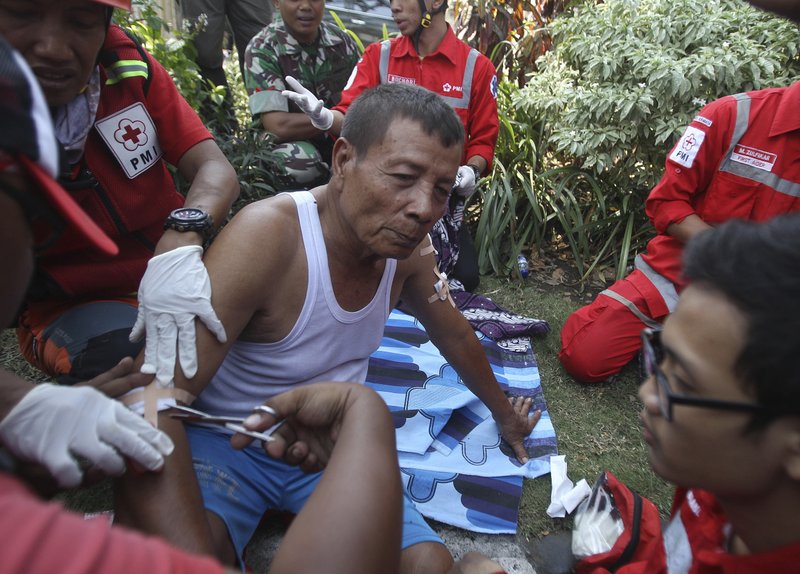SURABAYA, Indonesia -- Coordinated suicide bombings carried out by members of the same family struck three churches in Indonesia's second-largest city Sunday, police said, as the world's most populous Muslim nation recoiled at one of its worst attacks since the 2002 Bali bombings.
At least seven people died at the churches in Surabaya along with the six family members, the youngest of whom were girls ages 9 and 12, according to police. Another 41 people were injured.
Indonesia's president condemned the attacks as "barbaric."
Early today, the police headquarters in Surabaya was attacked by suspected militants who detonated explosives from a motorcycle.
CCTV footage shows a car and two motorcycles approaching a security checkpoint at the police complex followed by an explosion from one of the motorbikes with at least two people aboard it.
Surabaya police spokesman Frans Barung Mangera said civilians and police were victims of the attack. Police later said four officers and six civilians were wounded.
National police chief Tito Karnavian said that in the church bombings, the father detonated a car bomb, two sons ages 18 and 16 used a motorcycle for their attack, and the mother and her two daughters wore explosives.
Karnavian said the family had returned to Indonesia from Syria, where until recently the Islamic State group controlled significant territory.
The Islamic State claimed responsibility for the attacks in a statement carried by its Aamaq news agency. It didn't mention anything about families or children taking part and said there were only three attackers.
Indonesia's deadliest terrorist attack occurred in 2002, when bombs exploded on the tourist island of Bali, killing 202 people in one night, mostly foreigners.
Jemaah Islamiyah, the network responsible for the Bali attacks, was obliterated by a sustained crackdown on militants by Indonesia's counterterrorism police with U.S. and Australian support. A new threat has emerged in recent years, inspired by Islamic State attacks abroad.
Experts on militant networks have warned for several years that the estimated 1,100 Indonesians who traveled to Syria to join the Islamic State posed a threat if they returned home.
Karnavian identified the father as Dita Futrianto and said he was head of the Surabaya cell of Jemaah Anshorut Daulah, an Indonesian militant network affiliated with the Islamic State that has been implicated in attacks in Indonesia in the past year. He identified the mother as Puji Kuswati.
The attacks occurred within minutes of one another, according to Mangera.
Karnavian said Futrianto drove a bomb-laden car into the city's Pentecostal church.
Kuswati, with her two daughters, attacked the Christian Church of Diponegoro, he said. Based on their remains, Karnavian said the mother and daughters were all wearing explosives around their waists.
The sons rode a motorcycle onto the grounds of the Santa Maria Church and detonated their explosives there.
A witness said the woman arrived at the Diponegoro church carrying two bags.
"At first officers blocked them in front of the churchyard, but the woman ignored them and forced her way inside. Suddenly, she hugged a civilian, then [the bomb] exploded," said the witness, a security guard who identified himself as Antonius.
A street merchant outside Santa Maria, a Catholic church, said she was thrown several yards by the blast.
"I saw two men riding a motorbike force their way into the churchyard. One was wearing black pants and one with a backpack," said the merchant, Samsia, who uses a single name. "Soon after that, the explosion happened."
President Joko Widodo visited the sites and described the attacks as "cowardly actions" that were "very barbaric and beyond the limit of humanity."
In Jakarta, Indonesia's capital, the Indonesian Church Association added its condemnation.
"We are angry," said Gormar Gultom, an official with the association, but he urged people to let the police investigation take its course.
Indonesia's two largest Muslim organizations, Nahdlatul Ulama and Muhammadiyah, also condemned the attacks.
Mangera, the Surabaya police spokesman, said police responded about 9 p.m. to an explosion in a residential building in Sidoarjo, a district bordering Surabaya.
He confirmed TV reports that three people, including a child, were inside the fifth-floor flat at the time of the blast. A bomb squad was checking the building, he said, and hundreds of people were evacuated from the neighborhood.
Separately, national police spokesman Setyo Wasisto said police fatally shot four suspected militants and arrested two others early Sunday in West Java towns. It wasn't clear whether the shootings were connected to the church attacks. He identified the militants as members of Jemaah Anshorut Daulah.
Information for this article was contributed by Niniek Karmini, Ali Kotarumalos and Stephen Wright of The Associated Press.
A Section on 05/14/2018

